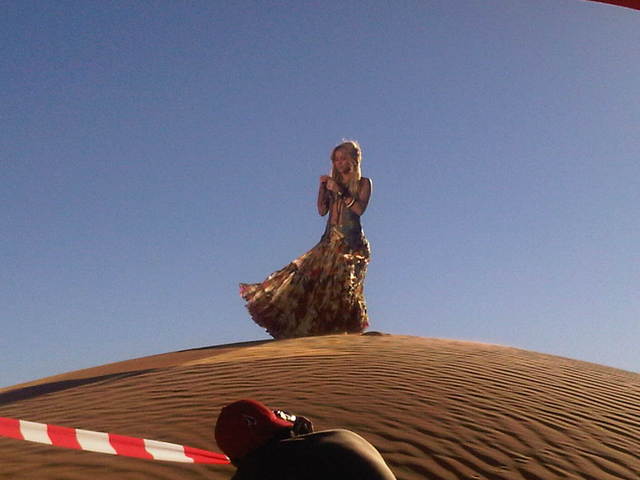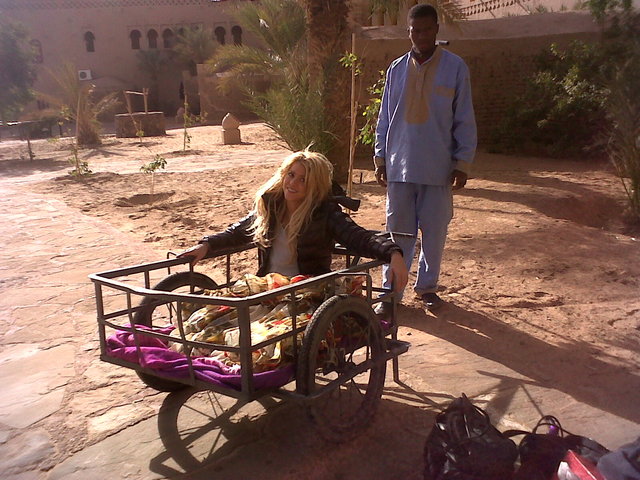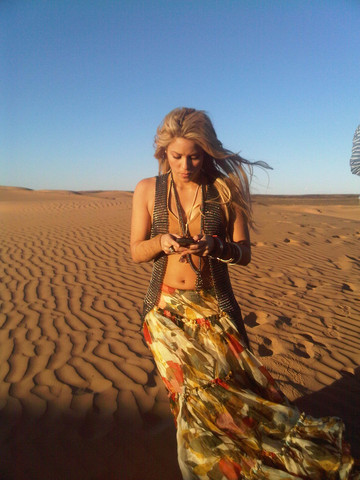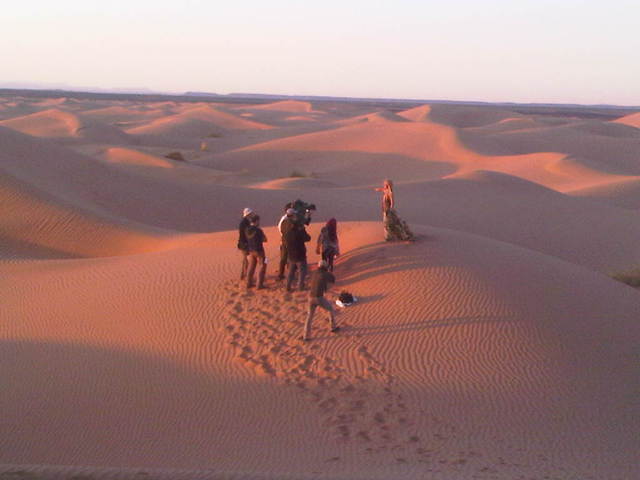 |
|
| Geography |
| Strategic location along Strait of Gibraltar |
| Location: | Northern Africa, bordering the North Atlantic Ocean and the Mediterranean Sea, between Algeria and Western Sahara |
| Geographic coordinates: | 32 00 N, 5 00 W |
| Area: | total: 446,550 sq km land: 446,300 sq km water: 250 sq km
Size comparison: slightly larger than California |
| Land Boundaries: | total: 2,017.9 km border countries: Algeria 1,559 km, Western Sahara 443 km, Spain (Ceuta) 6.3 km, Spain (Melilla) 9.6 km |
| Coastline: | 1,835 km |
| Maritime claims: | territorial sea: 12 nm contiguous zone: 24 nm exclusive economic zone: 200 nm continental shelf: 200 m depth or to the depth of exploitation |
| Climate: | Mediterranean, becoming more extreme in the interior |
| Terrain: | northern coast and interior are mountainous with large areas of bordering plateaus, intermontane valleys, and rich coastal plains |
| Elevation extremes: | lowest point: Sebkha Tah -55 m highest point: Jebel Toubkal 4,165 m |
| Natural resources: | phosphates, iron ore, manganese, lead, zinc, fish, salt |
| Land use: | arable land: 19% permanent crops: 2% other: 79% (2005) |
| Irrigated land: | 14,450 sq km (2003) |
| Natural hazards: | northern mountains geologically unstable and subject to earthquakes; periodic droughts |
| Current Environment Issues: | land degradation/desertification (soil erosion resulting from farming of marginal areas, overgrazing, destruction of vegetation); water supplies contaminated by raw sewage; siltation of reservoirs; oil pollution of coastal waters |
| International Environment Agreements: | party to: Biodiversity, Climate Change, Climate Change-Kyoto Protocol, Desertification, Endangered Species, Hazardous Wastes, Law of the Sea, Marine Dumping, Ozone Layer Protection, Ship Pollution, Wetlands, Whaling signed, but not ratified: Environmental Modification |
|
| People |
| Population: | 31,285,174 (July 2009 est.) country comparison to the world: 38 |
| Age structure: | 0-14 years: 30% (male 5,333,396/female 5,131,886) 15-64 years: 64.7% (male 11,261,139/female 11,305,792) 65 years and over: 5.2% (male 781,089/female 1,046,062) (2009 est.) |
| Median age: | total: 25 years male: 24.5 years female: 25.6 years (2009 est.) |
| Population growth rate: | 1.099% (2009 est.) |
| Birth rate: | 19.72 births/1,000 population (2009 est.) |
| Death rate: | 4.74 deaths/1,000 population (July 2009 est.) |
| Net migration rate: | -3.99 migrant(s)/1,000 population (2009 est.) |
| Sex ratio: | at birth: 1.05 male(s)/female under 15 years: 1.04 male(s)/female 15-64 years: 1 male(s)/female 65 years and over: 0.75 male(s)/female total population: 0.99 male(s)/female (2009 est.) |
| Infant mortality rate: | total: 29.75 deaths/1,000 live births male: 34.77 deaths/1,000 live births female: 24.49 deaths/1,000 live births (2009 est.) |
| Life expectancy at birth: | total population: 75.47 years male: 72.42 years female: 78.68 years (2009 est.) |
| Total fertility rate: | 2.27 children born/woman (2009 est.) |
| HIV/AIDS - adult prevalence rate: | 0.1% (2007 est.) |
| HIV/AIDS - people living with HIV/AIDS: | 21,000 (2007 est.) |
| HIV/AIDS - deaths: | fewer than 1,000 (2007 est.) |
| Nationality: | noun: Moroccan(s) adjective: Moroccan |
| Ethnic groups: | Arab-Berber 99.1%, other 0.7%, Jewish 0.2% |
| Religions: | Muslim 98.7%, Christian 1.1%, Jewish 0.2% |
| Languages: | Arabic (official), Berber dialects, French often the language of business, government, and diplomacy |
| Literacy: | definition: age 15 and over can read and write total population: 52.3% male: 65.7% female: 39.6% (2004 census) |
|
| Government |
| Country name: | conventional long form: Kingdom of Morocco conventional short form: Morocco local long form: Al Mamlakah al Maghribiyah local short form: Al Maghrib |
| Government type: | constitutional monarchy |
| Capital: | name: Rabat geographic coordinates: 34 01 N, 6 49 W time difference: UTC 0 (5 hours ahead of Washington, DC during Standard Time) |
| Administrative divisions: | 15 regions; Grand Casablanca, Chaouia-Ouardigha, Doukkala-Abda, Fes-Boulemane, Gharb-Chrarda-Beni Hssen, Guelmim-Es Smara, Laayoune-Boujdour-Sakia El Hamra, Marrakech-Tensift-Al Haouz, Meknes-Tafilalet, Oriental, Rabat-Sale-Zemmour-Zaer, Souss-Massa-Draa, Tadla-Azilal, Tanger-Tetouan, Taza-Al Hoceima-Taounate note: Morocco claims the territory of Western Sahara, the political status of which is considered undetermined by the US Government; portions of the regions Guelmim-Es Smara and Laayoune-Boujdour-Sakia El Hamra as claimed by Morocco lie within Western Sahara; Morocco also claims Oued Eddahab-Lagouira, another region which falls entirely within Western Sahara |
| Independence: | 2 March 1956 (from France) |
| National holiday: | Throne Day (accession of King MOHAMMED VI to the throne), 30 July (1999) |
| Constitution: | 10 March 1972; revised 4 September 1992, amended September 1996 note: the amendment of September 1996 was to create a bicameral legislature |
| Legal system: | based on Islamic law and French and Spanish civil law systems; judicial review of legislative acts in Constitutional Chamber of Supreme Court; has not accepted compulsory ICJ jurisdiction |
| Suffrage: | 18 years of age; universal (as of January 2003) |
| Executive branch: | chief of state: King MOHAMMED VI (since 30 July 1999) head of government: Prime Minister Abbas EL FASSI (since 19 September 2007) cabinet: Council of Ministers appointed by the monarch elections: the monarch is hereditary; prime minister appointed by the monarch following legislative elections |
| Legislative branch: | bicameral Parliament consists of a Chamber of Counselors (or upper house) (270 seats; members elected indirectly by local councils, professional organizations, and labor syndicates for nine-year terms; one-third of the members are elected every three years) and Chamber of Representatives (or lower house) (325 seats; 295 members elected by multi-seat constituencies and 30 from national lists of women; members elected by popular vote for five-year terms) elections: Chamber of Counselors - last held 8 September 2006 (next to be held in 2009); Chamber of Representatives - last held 7 September 2007 (next to be held in 2012) election results: Chamber of Counselors - percent of vote by party - NA; seats by party - PI 17, MP 14, RNI 13, USFP 11, UC 6, PND 4, PPS 4, Al Ahd 4, other 17; Chamber of Representatives - percent of vote by party - NA; seats by party - PI 52, PJD 46, MP 41, RNI 39, USFP 38, UC 27, PPS 17, FFD 9, MDS 9, Al Ahd 8, other 39 |
| Judicial branch: | Supreme Court (judges are appointed on the recommendation of the Supreme Council of the Judiciary, presided over by the monarch) |
| Political parties and leaders: | Action Party or PA [Mohammed EL IDRISSI]; Al Ahd (The Covenant) Party [Najib EL OUAZZANI]; Alliance des Libert'es (Alliance of Liberty) or ADL [Ali BELHAJ]; An-Nahj Ad-Dimocrati or An-Nahj [Abdellah EL HARIF]; Authenticity and Modernity Party or PAM [Mohamed Cheikh BIADILLAH, Secretary General]; Choura et Istiqlal (Consultation and Independence) Party or PCI [Abdelwahed MAACH]; Citizens' Forces or FC [Abderrahman LAHJOUJI]; Citizenship and Development Initiative or ICD [Mohamed BENHAMOU]; Constitutional Union Party or UC [Mohammed ABIED]; Democratic and Social Movement or MDS [Mahmoud ARCHANE]; Democratic Forces Front or FFD [Touhami EL KHIARI]; Democratic Socialist Vanguard Party or PADS [Ahmed BENJELLOUN]; Democratic Society Party or PSD [Zhor CHEKKAFI]; Democratic Union or UD [Bouazza IKKEN]; Environment and Development Party or PED [Ahmed EL ALAMI]; Istiqlal (Independence) Party or PI [Abbas EL FASSI]; Justice and Development Party or PJD [Abdelilah BENKIRANE]; Labor Party or PT [Abdelkrim BENATIK]; Moroccan Liberal Party or PML [Mohamed ZIANE]; National Democratic Party or PND [Abdallah KADIRI]; National Ittihadi Congress Party or CNI [Abdelmajid BOUZOUBAA]; National Popular Movement or MNP [Mahjoubi AHERDANE]; National Rally of Independents or RNI [Mustapha EL MANSOURI]; National Union of Popular Forces or UNFP [Abdellah IBRAHIM]; Popular Movement or MP [Mohamed LAENSER]; Progress and Socialism Party or PPS [Ismail ALAOUI]; Reform and Development Party or PRD [Abderrahmane EL KOUHEN]; Renaissance and Virtue Party or PRV [Mohamed KHALIDI]; Renewal and Equity Party or PRE [Chakir ACHABAR]; Social Center Party or PSC [Lahcen MADIH]; Socialist Democratic Party or PSD [Aissa OUARDIGHI]; Socialist Union of Popular Forces or USFP [Abdelwahed RADI]; Unified Socialist Left Party or PGSU [Mohamed Ben Said AIT IDDER] |
| Political pressure groups and leaders: | Democratic Confederation of Labor or CDT [Noubir AMAOUI]; General Union of Moroccan Workers or UGTM [Abderrazzak AFILAL]; Moroccan Employers Association or CGEM [Hassan CHAMI]; National Labor Union of Morocco or UNMT [Abdelslam MAATI]; Union of Moroccan Workers or UMT [Mahjoub BENSEDDIK] |
| International organization participation: | ABEDA, AfDB, AFESD, AMF, AMU, EBRD, FAO, G-77, IAEA, IBRD, ICAO, ICC, ICCt (signatory), ICRM, IDA, IDB, IFAD, IFC, IFRCS, IHO, ILO, IMF, IMO, IMSO, Interpol, IOC, IOM, IPU, ISO, ITSO, ITU, ITUC, LAS, MIGA, MONUC, NAM, OAS (observer), OIC, OIF, OPCW, OSCE (partner), Paris Club (associate), PCA, UN, UNCTAD, UNESCO, UNHCR, UNIDO, UNOCI, UNWTO, UPU, WCL, WCO, WFTU, WHO, WIPO, WMO, WTO |
| Diplomatic representation in the US: | chief of mission: Ambassador Aziz MEKOUAR chancery: 1601 21st Street NW, Washington, DC 20009 telephone: [1] (202) 462-7979 FAX: [1] (202) 265-0161 consulate(s) general: New York |
| Diplomatic representation from the US: | chief of mission: Ambassador Samuel L. KAPLAN embassy: 2 Avenue de Mohamed El Fassi, Rabat mailing address: PSC 74, Box 021, APO AE 09718 telephone: [212] (37) 76 22 65 FAX: [212] (37) 76 56 61 consulate(s) general: Casablanca |
|
| Economy |
| Economic policies pursued since 2003 by King Mohammed VI have brought macroeconomic stability to the country, improved financial sector performance, and made steady progress in developing the services and industrial sectors. The National Initiative for Human Development (INDH), a $2 billion initiative launched by the King in 2005, has improved social welfare through a successful rural electrification program, an overhaul of the tourism and agriculture sectors, and the gradual replacement of urban slums with decent housing. Despite the INDH's success, Morocco continues to grapple with a high illiteracy rate, a low education enrollment rate, and a high urban youth unemployment rate of around 30%. Moroccan exports have dropped sharply since mid-2008 as a result of the decline in global phosphates prices--the bulk of Moroccan exports by value--and the global economic slowdown. The economic slowdown in Europe--Morocco's main export market--also prompted a decline in the flow of foreign tourists and remittances, two primary sources of foreign currency. A record agricultural harvest, strong government spending, and domestic consumption, however, combined to partly offset losses from weak exports and helped GDP grow at a weak but positive 2.6% in 2009. Despite structural adjustment programs supported by the IMF, the World Bank, and the Paris Club, the dirham is only fully convertible for selected transactions. In 2006, Morocco entered a Free Trade Agreement (FTA) with the US, and in 2008 entered into an advanced status in its 2000 Association Agreement with the EU. Long-term challenges include improving education and job prospects for Morocco's youth, closing the income gap between the rich and the poor, confronting corruption, and expanding and diversifying exports beyond phosphates and low-value added products. |
| GDP (purchasing power parity): | GDP (purchasing power parity): $145.2 billion (2009 est.) $139.6 billion (2008 est.) $131.5 billion (2007 est.) note: data are in 2009 US dollars |
| GDP (official exchange rate): | GDP (official exchange rate): $90.78 billion (2009 est.) |
| GDP - real growth rate: | 4% (2009 est.) 6.2% (2008 est.) 3.2% (2007 est.) |
| GDP - per capita (PPP): | GDP - per capita (PPP): $4,600 (2009 est.) $4,500 (2008 est.) $4,300 (2007 est.) note: data are in 2009 US dollars |
| GDP - composition by sector: | agriculture: 18.8% industry: 32.6% services: 48.6% (2009 est.) |
| Labor force: | 11.46 million (2009 est.) |
| Labor force - by occupation: | agriculture: 44.6% industry: 19.8% services: 35.5% (2006 est.) |
| Unemployment rate: | 9.1% (2009 est.) 9.5% (2008 est.) |
| Population below poverty line: | 15% (2007 est.) |
| Household income or consumption by percentage share: | lowest 10%: 2.7% highest 10%: 33.2% (2007) |
| Distribution of family income - Gini index: | 40 (2005) 39.5 (1999 est.) |
| Inflation rate (consumer prices): | Inflation rate (consumer prices): 2% (2009 est.) 3.8% (2008 est.) |
| Investment (gross fixed): | Investment (gross fixed): 32.5% of GDP (2009 est.) |
| Budget: | revenues: $22.9 billion expenditures: $23.86 billion (2009 est.) |
| Public debt: | 54.1% of GDP (2009 est.) 55.6% of GDP (2008 est.) |
| Agriculture - products: | barley, wheat, citrus, wine, vegetables, olives; livestock |
| Industries: | phosphate rock mining and processing, food processing, leather goods, textiles, construction, tourism |
| Industrial production growth rate: | 1.9% (2009 est.) |
| Electricity - production: | 21.56 billion kWh (2007 est.) |
| Electricity - consumption: | 20.78 billion kWh (2007 est.) |
| Electricity - exports: | 0 kWh (2008 est.) |
| Electricity - imports: | 3.455 billion kWh (2007 est.) |
| Oil - production: | 4,310 bbl/day (2008 est.) |
| Oil - consumption: | 187,000 bbl/day (2008 est.) |
| Oil - exports: | 17,420 bbl/day (2007 est.) |
| Oil - imports: | 195,800 bbl/day (2007 est.) |
| Oil - proved reserves: | 750,000 bbl (1 January 2009 est.) |
| Natural gas - production: | 60 million cu m (2008 est.) |
| Natural gas - consumption: | 560 million cu m (2008 est.) |
| Natural gas - exports: | 0 cu m (2008 est.) |
| Natural gas - imports: | 500 million cu m (2008 est.) |
| Natural gas - proved reserves: | 1.501 billion cu m (1 January 2009 est.) |
| Current account balance: | $-3.795 billion (2009 est.) $-5.836 billion (2008 est.) |
| Exports: | $15.61 billion (2009 est.) $20.17 billion (2008 est.) |
| Exports - commodities: | clothing and textiles, electric components, inorganic chemicals, transistors, crude minerals, fertilizers (including phosphates), petroleum products, citrus fruits, vegetables, fish |
| Exports - partners: | Spain 19.2%, France 17.6%, Brazil 7.1%, US 4.5%, Belgium 4.5%, Italy 4.3% (2008) |
| Imports: | $31.83 billion (2009 est.) $39.35 billion (2008 est.) |
| Imports - commodities: | crude petroleum, textile fabric, telecommunications equipment, wheat, gas and electricity, transistors, plastics |
| Imports - partners: | France 16.1%, Spain 13.5%, Italy 6.5%, China 6%, Germany 5.6%, Saudi Arabia 5.4%, Moldova 5% (2008) |
| Reserves of foreign exchange and gold: | $21.54 billion (31 December 2009 est.) $22.72 billion (31 December 2008 est.) |
| Debt - external: | $20.06 billion (31 December 2009 est.) $20.12 billion (31 December 2008 est.) |
| Stock of direct foreign investment - at home: | $42.68 billion (31 December 2009 est.) $42.68 billion (31 December 2009 est.) |
| Stock of direct foreign investment - abroad: | $641 million (31 December 2009 est.) $966 million (31 December 2008 est.) |
| Market value of publicly traded shares: | $65.75 billion (31 December 2008) $75.49 billion (31 December 2007) $49.36 billion (31 December 2006) |
| Exchange rates: | Moroccan dirhams (MAD) per US dollar - 8.1081 (2009), 7.526 (2008), 8.3563 (2007), 8.7722 (2006), 8.865 (2005) |
|
| Communications |
| Telephones in use: | 2.991 million (2008) country comparison to the world: 50 |
| Cellular Phones in use: | 22.816 million (2008) |
| Telephone system: | general assessment: modern system with all important capabilities; however, density is low with only 9 fixed lines available for each 100 persons; mobile-cellular subscribership reached 65 per 100 persons in 2008 domestic: good system composed of open-wire lines, cables, and microwave radio relay links; Internet available but expensive; principal switching centers are Casablanca and Rabat; national network nearly 100% digital using fiber-optic links; improved rural service employs microwave radio relay international: country code - 212; landing point for the SEA-ME-WE-3 optical telecommunications submarine cable that provides connectivity to Asia, the Middle East, and Europe; satellite earth stations - 2 Intelsat (Atlantic Ocean) and 1 Arabsat; microwave radio relay to Gibraltar, Spain, and Western Sahara; coaxial cable and microwave radio relay to Algeria; participant in Medarabtel; fiber-optic cable link from Agadir to Algeria and Tunisia (2008) |
| Radio broadcast stations: | AM 27, FM 25, shortwave 6 (1998) |
| Television broadcast stations: | 35 (plus 66 repeaters) (1995) |
| Internet country code: | .ma |
| Internet hosts: | 276,521 (2009) |
| Internet users: | 10.3 million (2008) |
|
| Transportation |
| Airports: | 58 (2009) country comparison to the world: 81 |
| Airports (paved runways): | total: 32 over 3,047 m: 11 2,438 to 3,047 m: 7 1,524 to 2,437 m: 10 914 to 1,523 m: 4 (2009) |
| Airports (unpaved runways): | total: 26 2,438 to 3,047 m: 1 1,524 to 2,437 m: 7 914 to 1,523 m: 10 under 914 m: 8 (2009) |
| Heliports: | 1 (2009) |
| Pipelines: | gas 830 km; oil 439 km (2008) |
| Railways: | total: 1,907 km standard gauge: 1,907 km 1.435-m gauge (1,022 km electrified) (2008) |
| Roadways: | total: 57,625 km paved: 35,664 km (includes 639 km of expressways) unpaved: 21,961 km (2006) |
| Merchant marine: | total: 35 by type: cargo 3, chemical tanker 6, container 8, passenger/cargo 13, petroleum tanker 1, roll on/roll off 4 foreign-owned: 16 (France 14, Germany 2) registered in other countries: 4 (Gibraltar 4) (2008) |
| Ports and terminals: | Agadir, Casablanca, Mohammedia, Safi |
|
| Military |
|
| Military branches: | Royal Armed Forces (Forces Armees Royales, FAR): Royal Moroccan Army (includes Air Defense), Navy (includes Marines), Royal Moroccan Air Force (Al Quwwat al Jawyiya al Malakiya Marakishiya; Force Aerienne Royale Marocaine) (2008) |
| Military service age and obligation: | 18 years of age for compulsory and voluntary military service; conscript service obligation - 18 months (2004) |
| Manpower available for military service: | males age 16-49: 9,152,580 females age 16-49: 9,080,830 (2008 est.) |
| Manpower fit for military service: | males age 16-49: 7,779,589 females age 16-49: 7,881,024 (2009 est.) |





















